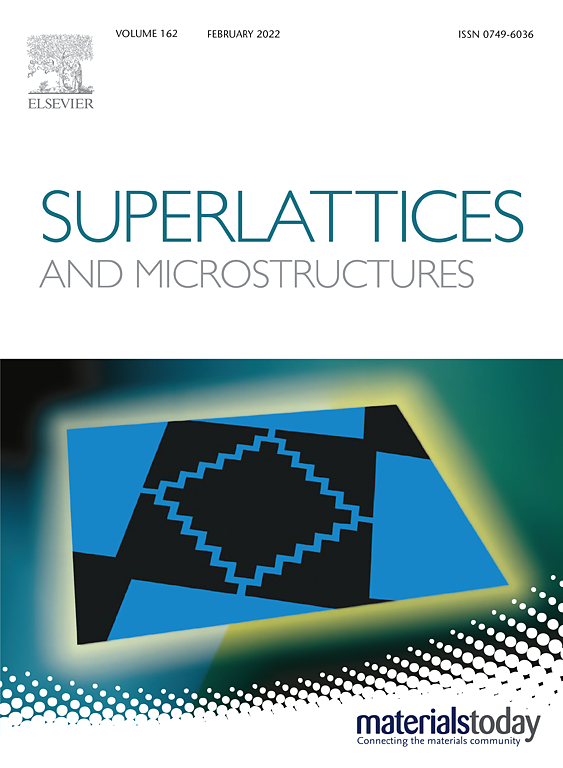Influence of softening annealing on microstructural heredity and mechanical properties of medium-Mn steel
IF 3.3
3区 物理与天体物理
Q2 PHYSICS, CONDENSED MATTER
引用次数: 0
Abstract
Softening annealing (SA) is often required for producing medium-Mn steels (MMS) as it lowers hardness so that they can be cold rolled to reduce thickness. The influences of different SA processes on the microstructural heredity during the processing route and the final tensile properties were studied. It was found that the SA process could either intensify or weaken the influence of the Mn segregation resulting from solidification on the subsequent microstructural evolution during the process, i.e., microstructural heredity. In the case when no SA was employed, both recrystallization and rapid growth of ferrite grains preceded the reverse austenitic transformation during the intercritical annealing (IA) in the Mn-lean regions, where very coarse ferrite grains were formed. This deteriorated ductility was due to the propagation of cracking along the boundary of the coarse-grained and fine-grained regions. In contrast, SA at a sufficiently high temperature could dissolve cementite, producing uniformly distributed austenite grains. They transformed to martensite during cold rolling but were reborn during IA. As a result, ultrafine austenite and ferrite grains were uniformly distributed, which improved ductility significantly. This study hints at a new approach to altering the microstructural heredity resulting from the heterogeneous Mn distribution in MMS.软化退火对中锰钢组织遗传和力学性能的影响
软化退火(SA)通常需要生产中锰钢(MMS),因为它降低硬度,使他们可以冷轧,以减少厚度。研究了不同的SA工艺对加工过程中组织遗传和最终拉伸性能的影响。结果表明,SA工艺可以增强或减弱凝固过程中Mn偏析对后续组织演变的影响,即组织遗传。在不使用SA的情况下,在贫锰区(Mn-lean area)的临界间退火(IA)过程中,铁素体晶粒的再结晶和快速生长先于反奥氏体转变,在那里形成了非常粗的铁素体晶粒。这种恶化的延性是由于裂纹沿粗晶和细晶区域的边界扩展。相反,SA在足够高的温度下可以溶解渗碳体,产生均匀分布的奥氏体晶粒。它们在冷轧过程中转变为马氏体,但在IA过程中重生。超细奥氏体和铁素体晶粒均匀分布,显著提高了塑性。本研究提示了一种新的方法来改变MMS中锰分布不均导致的微观结构遗传。
本文章由计算机程序翻译,如有差异,请以英文原文为准。
求助全文
约1分钟内获得全文
求助全文
来源期刊

Superlattices and Microstructures
物理-物理:凝聚态物理
CiteScore
6.10
自引率
3.20%
发文量
35
审稿时长
2.8 months
期刊介绍:
Superlattices and Microstructures has continued as Micro and Nanostructures. Micro and Nanostructures is a journal disseminating the science and technology of micro-structures and nano-structures in materials and their devices, including individual and collective use of semiconductors, metals and insulators for the exploitation of their unique properties. The journal hosts papers dealing with fundamental and applied experimental research as well as theoretical studies. Fields of interest, including emerging ones, cover:
• Novel micro and nanostructures
• Nanomaterials (nanowires, nanodots, 2D materials ) and devices
• Synthetic heterostructures
• Plasmonics
• Micro and nano-defects in materials (semiconductor, metal and insulators)
• Surfaces and interfaces of thin films
In addition to Research Papers, the journal aims at publishing Topical Reviews providing insights into rapidly evolving or more mature fields. Written by leading researchers in their respective fields, those articles are commissioned by the Editorial Board.
Formerly known as Superlattices and Microstructures, with a 2021 IF of 3.22 and 2021 CiteScore of 5.4
 求助内容:
求助内容: 应助结果提醒方式:
应助结果提醒方式:


